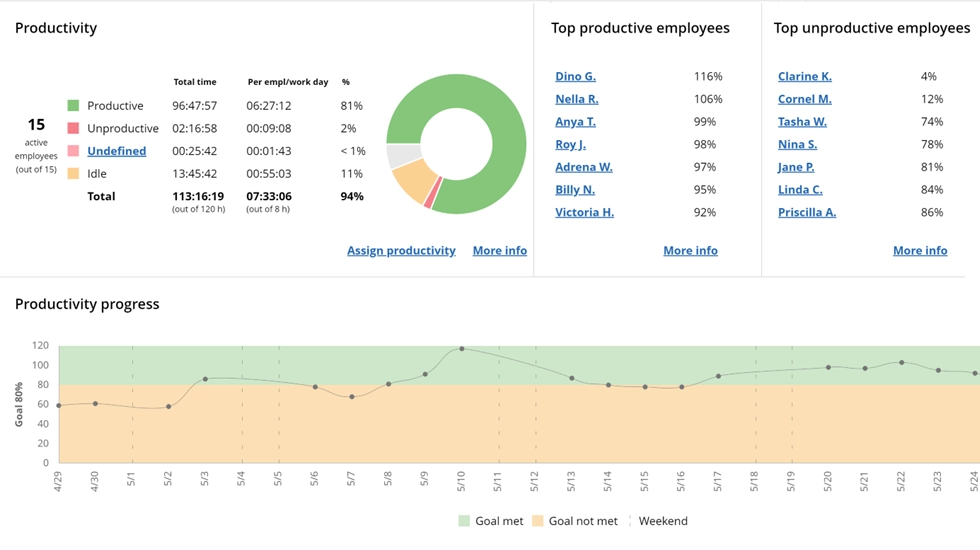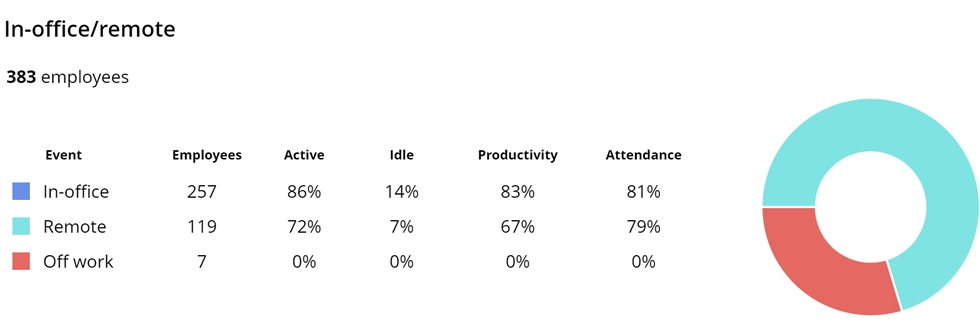Position of Northern Europe on the global salary chart
Nowadays, the Nordic countries are among the top destinations with the highest GDP per capita in the world. After decades of dealing with crises, these countries developed an economic model known for its stability, high living standards, and strong welfare system.This article has been prepared by WorkTime. We are non-invasive remote employee monitoring software with 20+ years of experience in the market.
Labor laws in Northern Europe
European countries' labor laws differ from the US ones. Here are the main aspects to consider:- European countries have robust employment protections, so it’s difficult to terminate employees without cause;
- A great degree of job security;
- Social protection is guaranteed, including paid parental leave, universal healthcare, and retirement benefits;
- Legally established working hours and vacation time. European countries usually have shorter working hours compared to the US;
- Formal and detailed job offers and employment contracts; the last ones are required by law;
- The employment process is formal and should follow strict regulations.
What industry does Northern Europe heavily rely on?
Norway
The key sectors are oil and gas, hydropower, seafood, maritime, trade, tourism, and banking. Norway is known for its economic trends:- Norway is rich in natural resources, so the country is searching for ways to manage them responsibly;
- Development of new technologies for green and sustainable solutions;
- Friendly and flexible business sector;
- The Norwegian economy is based on international cooperation.
Sweden
The most profitable sectors in Sweden are manufacturing, industrials, TMT (technology, media, and telecom), clean technology, oil and gas, SaaS, life sciences, and fintech. The Swedish government finances and provides grants for funding sustainable startups. Also, Sweden is known for its pharmaceutical products export.Lithuania
Key Lithuanian sectors include food and beverage, the energy industry (a hub transporting oil and transit routes for natural gas), the laser technology industry, and ICT (information and communications technology).Estonia
Estonia's high-income and prospective industries are oil shale, machinery, chemical products, equipment, and textiles. As for the service sector, transportation, banking, and telecommunications take the leading positions. What’s more, IT is now one of the fastest-growing and most profitable sectors in this country.Denmark
The main feature of the Danish economy is the focus on non-agriculture sectors. Promising and growing market fields in Denmark:- Digital technologies and services;
- Tourism;
- Renewable energy;
- Defense-related systems;
- Healthcare products and services.
Finland
A high level of industrialization, openness to trade, the Nordic welfare state model, and high economic output per capita are the main features of the Finnish economy. Among the market-leading sectors are machinery and equipment, ICT technologies, cleantech, and biotechnology.Latvia
The Latvian economy is based mainly on service industries, such as transportation, financial services, and IT. Also, the construction industry, metalworking, light industries, and tourism are among the leading sectors. The country is known for its developed chemistry industry, especially for bio and eco-friendly cosmetics production and export.Iceland
Iceland excels due to hydroelectric potential, renewable energy, and service sector growth. The main Icelandic industries involve aluminum production, food processing, manufacturing, and construction. As for the business sector, it is focused mainly on tourism, software production, banking, and biotechnology.Average salary in Northern Europe
North European countries have higher average wages than Southern and Eastern Europe.What is the average salary in Norway?
- the average salary in Norway per year is $53,755;
- the average monthly salary in Norway is $4,480;
- the average salary in Norway per hour is $45.15.
What is the average salary in Sweden?
- the average annual salary in Sweden is $50,406;
- the average monthly salary in Sweden is $4,200;
- the average salary in Sweden per hour is $28.49.
What is the average salary in Latvia?
- the average salary in Latvia per year is $34,136;
- the average monthly salary in Latvia is $2,844;
- the average salary in Latvia per hour is $11.59.
What is average salary in Lithuania?
- the average salary in Lithuania per year is $43,875;
- the average monthly salary in Lithuania is $3,656;
- the average salary in Lithuania per hour is $15.16.
What is the average salary in Estonia?
- the average salary in Estonia per year is $34,705;
- the average monthly salary in Estonia is $2,892;
- the average salary in Estonia per hour is $14.72.
What is the average salary in Denmark?
- the average yearly salary in Denmark is $64,127;
- the average salary in Denmark per month is $5,344;
- the average salary in Denmark per hour is $45.46.
What is average salary in Finland?
- the average yearly salary in Finland is $51,836;
- the average monthly salary in Finland is $4,320;
- the average salary in Finland per hour is $33.01.
What is average salary in Iceland?
- the average salary in Iceland per year is $79,473;
- the average salary in Iceland per month is $6,623;
- the average salary in Iceland per hour is $42.76.
The cost of living in Northern Europe
The average cost of living in Northern European countries depends on the country. Here you can compare the average cost of living for the month:- Norway: $1,964;
- Sweden: $1,479;
- Latvia: $1,002;
- Lithuania: $1,107;
- Estonia: $1,224;
- Denmark: $1,922;
- Finland: $1,580;
- Iceland: $2,457.
Nordic outsourcing trends
Scandinavia as a startup hub
Nordic countries are known worldwide as startup hubs. Fast development, numerous tech innovations, governmental support & financing, and a friendly & flexible business sector help to create the ideal environment for thriving startups.1. Sweden
It is one of the most technologically developed countries and a home for a number of startups. With the stable growth of IT and the amount of data, there is a strong need for talented specialists.2. Denmark
Denmark is known for the rapid development of such spheres as greentech, robotics, fintech, and IT. The shortage of IT graduates by 2030 leads to a serious lack of a qualified talent pool.3. Finland
As a global gaming leader, Finland is an attractive country for investment. For example, Japan has founded over 20 startups here. The leading tech industries are AI, gaming, robotics, and fintech.4. Norway
Norway is one of the richest countries in this region due to its gas and oil reserves. Still, the Norwegian economy is developing in different directions, especially in IT. The latest IT boom resulted in the fast growth of SaaS and hardware companies.5. Iceland
The government invests money in the development of startups and establishes private funds to increase the number of technology-related universities. In Iceland, VR and gaming are among the most popular IT sectors.Why do Nordic countries outsource?
IT outsourcing has become a trend in Nordic countries. So, what are the main reasons for that? High labor stress is the main cause of the rising need to outsource employees. Cost-effectiveness is the next driving factor in outsourcing business processes to countries with lower labor costs. Finally, outsourcing helps Nordic companies diversify their talent pool with domain-specific expertise.Top outsourcing destinations for Scandinavia
Scandinavian states outsource mainly to India and China. Still, nearshoring to Eastern Europe is a more popular practice for Nordic countries. The nearshoring grows its popularity in this region because of cultural similarities, a comfortable time zone, and data security concerns.Baltic countries - their role in global outsourcing
What makes the Baltics a top outsourcing destination?
Baltic countries are known for their high-quality standards, talented pool, and English-speaking IT specialists. What are the other reasons for outsourcing to Latvia, Lithuania, and Estonia?- Competitive prices. This region is popular for its lower hiring costs compared to other European countries;
- Overlapped working hours. The time zone is suitable for effective communication and coordination;
- High level of innovation. Baltic countries are known for the diversity of startups, contributing to different sectors, and driving innovation;
- STEM education. Most of the specialists are highly skilled in various domains of technology;
- Government support. Latvia, Lithuania, and Estonia’s governments are interested in the development of the IT sector, investing money, and providing business support.
What are the risks of outsourcing to the Baltics?
Latvia, Lithuania, and Estonia can soon face a talent pool shortage. The matter is that many skilled specialists are leaving these countries to be employed abroad. Besides, the aging workforce is also a challenge for IT development. Finally, Baltic countries have higher costs of labor compared to popular outsourcing hubs such as East Europe, India, or the Philippines.Where do the Baltics outsource?
The US, UK, Western Europe, and Nordic countries outsource the most to the Baltic region. Scandinavian countries are, thereby, the leaders of IT outsourcing to Estonia, Latvia, and Lithuania.Top 10 outsourcing cities in the Baltics
Here is a list of outsourcing hubs in the Baltic countries:- Tallinn;
- Riga;
- Vilnius;
- Kaunas;
- Valmiera;
- Klaipeda;
- Viljandi;
- Tartu;
- Narva;
- Daugavpils
Employee monitoring in Northern Europe
It is legal to monitor employees in Northern Europe if the employer adheres to EU laws. Thus, the monitoring process should correspond to the GDPR (General Data Protection Regulations), maintaining transparency and data protection. Besides, all the employees should be notified that they are being monitored and sign the consent form. Learn more about the legal nuances of employee monitoring in the EU here.Employee monitoring makes outsourcing more attractive
WorkTime employee monitoring software helps make outsourcing easy and effective. That’s how you can benefit from outsourced team monitoring:1. Increase employee productivity
WorkTime helps increase productivity instantly. Get 70+ comprehensive reports in numbers and detailed statistics showing each employee's progress.

Boost employee productivity with WorkTime! Here's a glimpse of the Productivity Summary Report, where you can see your top productive and unproductive employees, along with productivity progress over the last 30 days. Start your free trial to explore over 70 additional reports!
Start free trial2. Track outsourced team’s attendance
With automatic active time monitoring, different time zones won’t be a challenge anymore. WorkTime monitors the exact login/logout time, provides timesheets, and tracks active time progress.3. Compare in-office and remote teams
Multi-office monitoring is easy with WorkTime. Add different offices (in-office or remote) and evaluate productivity regardless of the time zone. You can also compare the progress of your outsourced teams and in-office staff.

WorkTime monitors and compares the performance of employees in different offices. With WorkTime, you can skip the guesswork and compare employee attendance, active time, and productivity across various locations.
Start free trial








